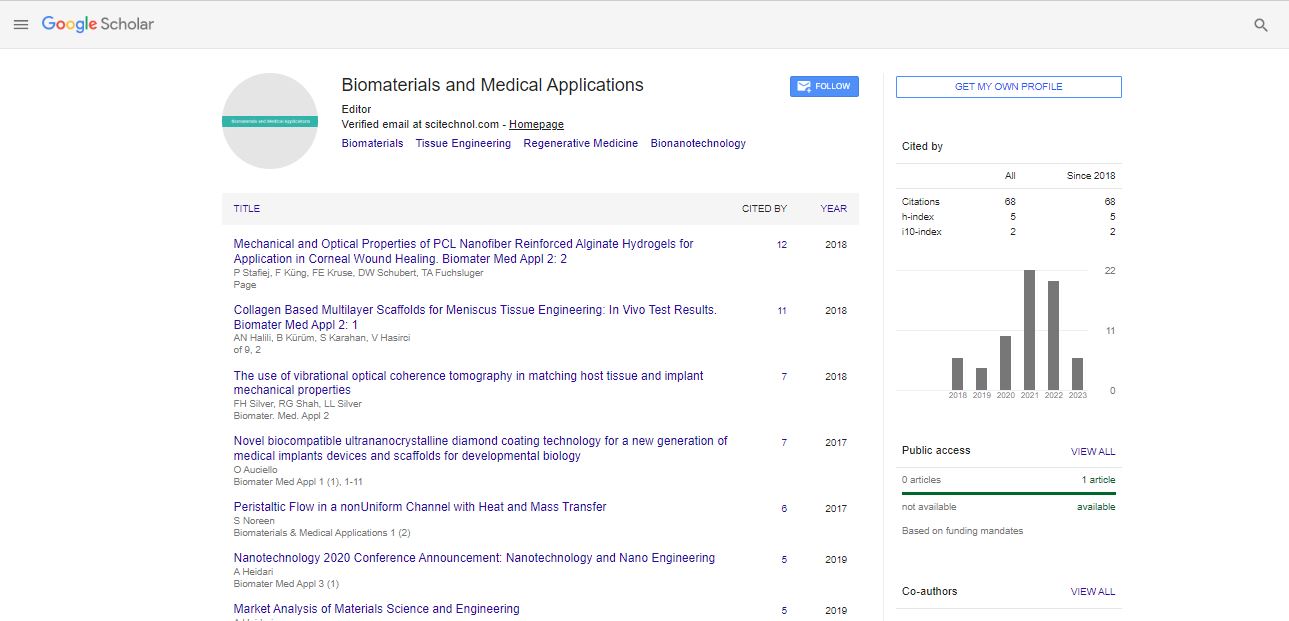Perspective, Biomater Med Appl Vol: 7 Issue: 1
Functionality of Dental Restorative Bio Materials
Reginald Essien*
Department of Dental Medicine, Hebrew University-Hadassah School of Dental Medicine, Jerusalem, Israel
*Corresponding Author: Reginald Essien
Department of Dental Medicine
Hebrew University-Hadassah School of Dental Medicine
Jerusalem, Israel
Email: essienreginald@yahoo.com
Received date: 15 February, 2023, Manuscript No. BMA-23-95671;
Editor assigned date: 17 February, 2023, Pre QC No. BMA-23-95671(PQ);
Reviewed date: 03 March, 2023, QC No. BMA-23-95671;
Revised date: 10 March, 2023, Manuscript No: BMA-23-95671(R);
Published date: 17 March, 2023, DOI: 10.35248/2577-0268.100512
Citation: Essien R (2023) Functionality of Dental Restorative Bio Materials. Biomater Med Appl 7:1.
Description
Dental restorative bio materials are used in dentistry to replace or repair damaged or missing teeth. They have become increasingly popular over the years because of their ability to mimic the natural teeth, and their biocompatibility with the body. In this article, we will explore the functionality of dental restorative bio materials and their advantages over traditional restorative materials. Dental restorative materials are required to fulfill basic stipulations consisting of similarity to tooth structures in their mechanical, bodily, and esthetic houses. Even though dental restorative substances range considerably of their traits, they're all, as soon as positioned as restorations, subjected to the severe situations of the oral cavity. After placement, dental restorative materials are in regular interaction with the encircling tissues. Even though dental restorative substances are fabricated to be as long lasting and inert as viable, restorations might also go to pot, degrade or fail, and during those procedures, components of these substances can be released into the oral cavity. Not only are these materials anticipated to hold their integrity in such severe situations, however additionally to keep those features at some point of function for extended periods.
Dental restorative bio materials are designed to restore the function, strength, and appearance of the teeth. These materials are composed of biocompatible substances, such as ceramics, composites, and metals, which allow them to integrate with the natural teeth and oral tissues. One of the main functions of dental restorative bio materials is to provide mechanical support to the teeth. These materials are strong and durable, which allows them to withstand the forces of chewing and biting. They also provide stability to the teeth, preventing them from shifting or moving around. Another important function of dental restorative bio materials is to protect the teeth from further damage. When a tooth is damaged, it becomes vulnerable to decay and other oral diseases. Dental restorative bio materials seal the damaged area and prevent bacteria from entering, which reduces the risk of further damage. Dental restorative bio materials also play a crucial role in maintaining the aesthetics of the teeth. These materials are available in a range of shades and colors, which allows them to match the natural color of the teeth. They are also designed to mimic the texture and translucency of the natural teeth, providing a natural-looking restoration.
Dental restorative bio materials offer several advantages over traditional restorative materials, such as amalgam and gold. These advantages include: Biocompatibility: Dental restorative bio materials are biocompatible with the body, which reduces the risk of allergic reactions and other adverse effects. Aesthetics: Dental restorative bio materials are available in a range of shades and colors, which allows them to blend seamlessly with the natural teeth. Strength and Durability: Dental restorative bio materials are strong and durable, which allows them to withstand the forces of chewing and biting. Preservation of tooth structure: Dental restorative bio materials require less removal of tooth structure than traditional restorative materials, which helps to preserve the natural tooth structure.
Dental restorative bio materials are an important part of modern dentistry. They offer a range of functional and aesthetic benefits, and are preferred over traditional restorative materials. By understanding the functionality of dental restorative bio materials, patients can make informed decisions about their oral health and treatment options.
 Spanish
Spanish  Chinese
Chinese  Russian
Russian  German
German  French
French  Japanese
Japanese  Portuguese
Portuguese  Hindi
Hindi 